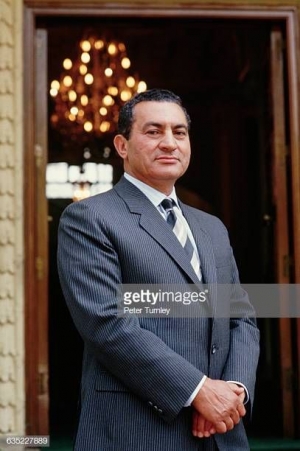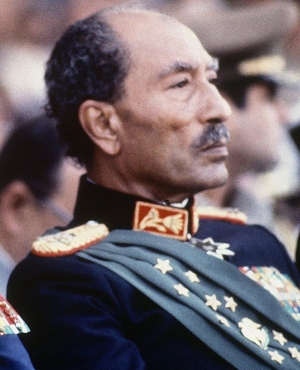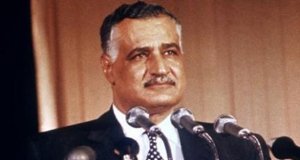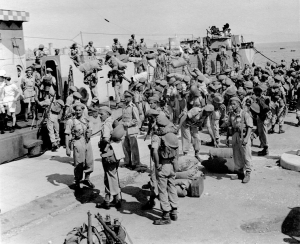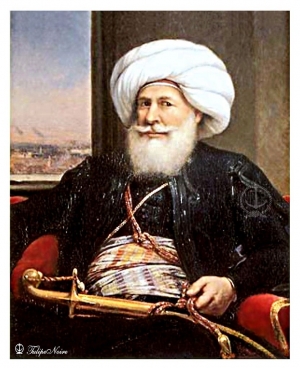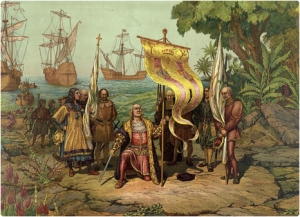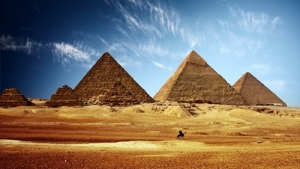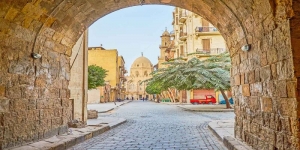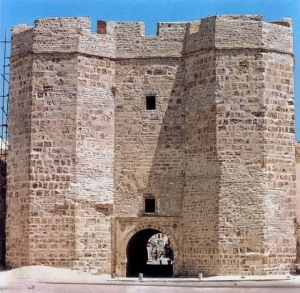+2 0122-345-3028
This email address is being protected from spambots. You need JavaScript enabled to view it.
Super User
The rule of Mubarak
The rule of Mubarak (1981-2011)
Vice-President Hosni Mubarak became President on October 14 following the assassination of late Anwar As-Sadat in October 1981.There were some improvements in Egyptian foreign affairs during 1984; Egyptian diplomacy managed to overcome the antagonistic reactions to the Camp David agreements. Their new position on the Palestinian question was based on the argument that "any fair settlement of the Middle East question had to take into full account the rights of the Palestinian people" assuring that "Arab solidarity was the only way to recover the usurped rights".
From early 1985 the economic situation became more difficult as revenues from oil, emigrants’ repatriated pay, canal fees and tourism, considerably declined. Islamic Fundamentalism was very powerful in opposition and became increasingly so as the Government’s popularity plummeted.
Between 1980 and 1986 there was a significant increase in the role of foreign capital in the Egyptian national economy and US aid continued to be a very important source of income. The Government received almost $3 billion per year, $1.3 billion of which was spent on defence. The Egyptian foreign debt increased from $2.4 billion in 1970 to $35 billion in 1986.
Representing contact between the Arab countries and the United States, Mubarak proposed, in the UN General Assembly in September 1989, arranging an Israeli-Palestinian dialogue, with no prior conditions. In October of the same year, relations with Libya were renewed.
The Iraqi troops invaded Kuwait in August 1990; Egypt was among the first Arab countries to condemn the action and sent troops to the Gulf immediately. The US announced the cancellation of the Egyptian military debt (approximately $7 billion) upon launching the land offensive to liberate Kuwait in January 1991.
The foreign debt reached a record $40 billion in 1990. Per capita income averaged some $600 per year, with over a third of the population living below the poverty line.
In May 1991, the IMF approved a stand-by loan of $372 million to Egypt, conditional on an economic "structural adjustment plan". Cairo committed itself to privatizing State-run companies, to eliminating controls on production and investment and to reducing the current fiscal deficit from 21 per cent to 6.5 per cent of the GNP. In order to achieve these goals the government decided to cut back subsidies on food and other staples and to reduce the program of aid for the needy.
On May 15 1991, foreign minister and deputy minister Esmat Abdel Majeed was named the new secretary- general of the Arab League. The appointment of Abdul Majeed, who is now replaced by the former Prime Minster Amru Musa, signified Egypt’s recovery of its leadership role within the Arab world.
The escalation of violence from Islamic fundamentalist groups led the Government to enact an anti-terrorist law and extend the state of emergency, which had been in effect for the past ten years, for another three years. According to official statistics, this violence resulted in 175 deaths between February 1992 and August 1993.
In May 1994, the President formed a committee to organize political talks between the Government and opposition with the exclusion of communists, the Muslim Brotherhood and groups representing the Coptic minority.
Internationally, Egypt recovered its main role in the Middle East peace talks and in the sphere of political exchanges between Arab countries. A meeting was held in Alexandria in December 1994 involving leaders from Egypt, Saudi Arabia and Syria. In February 1995, a summit joining leaders of Egypt, Jordan, Israel and Palestine was held in Cairo.
In 1995, Mubarak was unable to find a solution to the confrontation with Islamic fundamentalists. In January, the Egyptian minister of interior, Hasan Al-Alfi attended a meeting of Arab countries’ interior ministers in an attempt to coordinate the fight against violence of the Islamic fundamentalist movements.
In November 1995, the ruling National Democratic Party won the parliamentary elections with the participation of all the parties acknowledged by the Government. Elections, held amid a violent atmosphere, granted 416 of the 444 seats at stake to the ruling party, which provoked several accusations of fraud. In January 1996, Mubarak appointed Kamal al-Ganzouri as Prime Minister, replacing Atif Sedki.
Attacks by armed Islamic groups continued throughout 1996 and 1997, along with government repression of all such groups, including those opposed to the use of violence, like the Muslim Brotherhood.
The rule of Sadat
The rule of Sadat (1970-1981)
Anwar Sadat had been one of the original "Free Officers Group" and served as Nasser's vice-president and chosen successor, but he had never been taken seriously until he assumed control of the government. Sadat began to systematically reverse the failed socialist policies of his predecessor, ultimately expelling the Soviets and reforming the economy. But it was Sadat's surprise attack against Israeli forces in the Sinai on the Jewish holiday of Yom Kippur during the Muslim holy month of Ramadan on October 6, 1973 which gave Sadat the credibility which earned the respect of his countrymen. The "October War" shattered the image of Israeli invincibility which had persisted since the Six-Day War and gave the Arab world a tremendous psychological boost. Although the war turned against the Arabs and ended in a stalemate, Sadat emerged as a hero.
Sadat then set about liberalizing the Egyptian system. Political prisoners were granted amnesty, censorship of the press was lifted and political parties were allowed. Sadat also made a show of reversing the harsh secularism which was beginning to alienate the still traditionally religious middle classes by strongly identifying himself as a devout Muslim. At the same time, he instituted the Infitah, or "Open Door" policy, encouraging foreign investment and the development of the private sector. Gulf Arab investments began to flow into the country and international investment and foreign aid increased.
Still, the spectre of another debilitating war with Israel loomed. After years of socialist privation and militarism the Egyptian people had had enough. Although there were still echoes of pan-Arabism, the booming oil-producing Gulf economies had undergone a shift in attitude. At the same time, Egypt was facing pressure from the International Monetary Fund to remove the food subsidies, which were sapping the country's financial reserves. Sadat knew that this would undermine his political power so, instead of graduating the removal of subsidies, he did it in a single day at the beginning of 1977, causing prices to double suddenly and igniting what have been called the food riots. It was a brilliant ploy that caused the IMF to back down and reschedule Egypt's loans and the US to increase its foreign aid to the country. Food subsidies were immediately reinstated.
Sadat made his most dramatic and controversial political move later the same year. On November 19, 1977 Sadat suddenly traveled to Jerusalem with overtures of peace to Israel. On a global level the move was brilliant, catapulting Sadat to the front ranks of international diplomacy. He became the darling of the west and gave the Arab world a new image of moderation.
On a domestic and regional level, Sadat's peace initiative was to outrage the Arab world and alienate the president from many of his people. Never as charismatic as his predecessor, Sadat was perceived as a traitor, toadying to western interests. Egypt was the first Arab state to recognize Israel's right to exist and the subsequent Camp David agreements, which won Sadat and Israeli Prime Minister Menachem Begin the Nobel Peace Prize, further isolated Egypt from the rest of the Arab world. The Arab League relocated from Cairo to Tunis and many Arab countries severed diplomatic and trade relations.
Sadat's cultivation of the West, which was initially greeted with enthusiasm by most Egyptians, began to backfire after the peace initiative. Economic liberalization, which brought wealth to the upper and middle classes, brought inflation to the country and increased the poverty of the lower classes.
Sadat's support for Islam also began to backfire as groups like the Muslim Brotherhood gained wider support and became more vocal in their criticism of government economic policies and the Camp David agreements which were portrayed as a sell out to the Zionists. Militant fundamentalist groups throughout the Arab world and in Egypt began to call for Sadat's overthrow or assassination. After relaxing government repression Sadat resorted to wide-scale arrests and the western media who had coddled him since Camp David, suddenly turned on the president.
In October 1981 Sadat was assassinated at a military parade. He had become so isolated from his people by this time that his death and funeral elicited little reaction from a people that had poured into the streets in grief when his predecessor Naser had died.
President Nasser rule
President Nasser rule (1956-1970)
Gamal Abd-Al Nasser was a charismatic and brilliant political leader who achieved unprecedented popularity both in Egypt and throughout the Arab world. He was admired for his rousing support of Arab Nationalism; his domestic social programmes (which, for the first time in Egypt's history, sought to better the lot of the peasant majority); his dramatic nationalization of the Suez Canal; and also because of Egypt's heroic stand against the British invasion.
However Nasser's vehement opposition to Israel and his outspoken criticism of the West lost him US and European support for the building of the Aswan High Dam, forcing the Egyptian president to turn to the Soviets for aid. The need for capital to build the High Dam is cited as one of the reasons for nationalizing the Suez Canal.
Whatever Nasser's initial intentions, the Suez Crisis propelled him to the forefront of the Arab Nationalist movement. Pan Arab unity became the overriding theme of the Arab world from the late 1950s up to 1967 and Nasser became its chief advocate and spokesman. The most dramatic display of Pan-Arabism took place in 1958 when Egypt united with Syria to form a single country, the United Arab Republic. But Nasser, for all his oratory, was essentially an Egyptian nationalist. The practical interests of the two countries never meshed and the union came to nothing.
But Nasser's revolutionary pan-Arabism was not all talk. Egypt entered the Yemeni civil war against the monarchy on the side of leftist guerrillas, further alienating the west and Saudi Arabia. At the same time he strengthened Egypt's ties to the Soviet Union, relying on the communist bloc for technical and military assistance to build an army to fight the US-supported Israeli army. Nasser also supported the formation of the Palestine Liberation Organization, further alienating him from the West.
Nasser's relations with the West were complex. He knew that he could never develop Egypt without large infusions of foreign aid and he knew that the West was the most reliable source of this aid. Yet he came to discover that the more anti-Western his stance appeared to be, the more foreign aid he was offered by western countries to buy his moderation. When at one point in his regime he became more conciliatory to the west, his foreign aid dropped dramatically. As a founding-leader of the Non-aligned movement Nasser could have it both ways. Along with India's Nehru and Indonesia's Sukarno, Gamal Abd-Al Nasser became a major international power-broker in the politics of the developing world.
Nasser's pan-Arab politics of the period tend to overshadow the achievements of his regime. Land reform was put into effect, breaking up the large feudal estates into smaller parcels of land and redistributing land to the fellaheen who for millennia had been an underclass of serfs. When the Aswan High Dam was completed, arable land in the Nile Valley increased by 15%. Nasser also built the country's industrial base, powered by electricity generated from the High Dam.
Prior to the revolution, Egypt had been an elitist society with few, if any, state-sponsored benefits to the large majority of the population. The new government established extensive free educational programmes for both boys and girls and developed the country's medical infrastructure.
The country had to pay a heavy price for much of this development. Political repression and censorship increased. The educated classes and political elite who could have contributed to the building of the country were disenfranchised and persecuted. They were replaced by an under-educated socialist bureaucracy which provided Nasser with his power base, but which was grossly incompetent, setting the lowest possible standards for the administration of a great country. Economic stagnation and industrial and agricultural inefficiency subverted real development. Rhetoric had replaced reality.
The Six-Day War of June 1967 marked the end of Nasser's Pan-Arab dream. The Arab world's ignominious defeat by Israel ended in the Israeli occupation of Syria's Golan Heights, the Gaza Strip and the West Bank in Palestine and, most painfully for Egypt, the Sinai. However, the greatest symbolic humiliation for the Arabs was the fall of Jerusalem. The bombastic rhetoric of Arab leaders now seemed like so much hot air. Hatred of Israel and its chief supporter, the United States, reached a pinnacle.
The defeat of the Egyptian army and the loss of Sinai would have destroyed the political career of an Arab leader of lesser stature and indeed, Abd-Al Nasser offered to resign as president. Such was his extraordinary popularity that the Egyptian people staged massive spontaneous demonstrations in support of the president and he remained in power. His death in 1970 of a heart attack sent shock waves throughout the Arab world. In a stunning display of emotion, millions of Egyptians followed his funeral procession through the streets of Cairo.
British Occupation
British Occupation (1882-1952)
Ismail's son Tewfiq Pasha reformed the Egyptian economy and relinquished financial control to the British who began to run the government of the country. Egyptian nationalists, horrified at Tewfiq's submission to the British, forced him to appoint their leader Ahmed Orabi as Minister of War, but the European reaction was swift and violent. Alexandria was shelled and Ismailiyya occupied. Orabi's army was defeated at Tel El Kabir and the British reinstalled Tewfiq as a puppet. Orabi was driven into exile and Mustafa Kamil became the leader of the nationalist movement.
British influence over Egypt continued to increase. The country became an economic colony, totally dependent upon the import of British manufactured goods and the export of its raw cotton.
The outbreak of the World War I brought Egypt formally into the British Empire as a Protectorate when the Ottoman Sultan declared his support for the Germans against the allies. During the war Fouad, the sixth son of Khedive Ismail, had become Khedive of Egypt but his authority was to be constantly challenged by Egyptian nationalists who fed on the popular resentment of foreign domination.
Sa'ad Zaghloul was the leader of the nationalist movement during and after the first war and in 1918 he formally presented the British High Commissioner with a demand for complete autonomy which was rejected out of hand. Zaghloul's eventual arrest and deportation to Malta resulted in widespread anti-British riots, forcing the British to back down.
In 1922 the British ended the protectorate and recognized Egypt's independence, while maintaining control over the essential government institutions and the Suez Canal. Sultan Fouad was proclaimed King of Egypt in March of the same year.
The years that followed were characterized by a triangular power struggle between the British, the King and the nationalist Wafd party which had the support of the population.
Farouk, the son of King Fouad, ascended the Egyptian throne in 1935. In the beginning, the reign of King Farouk was greeted with enthusiasm by both the Wafd party and by the rapidly growing Muslim Brotherhood. Farouk was, amazingly, the first Egyptian ruler of the descendants of Mohammed Ali Pasha to speak fluent Arabic. Turkish had been the court language of all his predecessors. Moreover, Farouk seemed to have nationalist sympathies. The young ruler was, unfortunately, too weak to defy the British. Within a year he had signed the Anglo-Egyptian Treaty which gave British forces the right to remain in the Suez Canal Zone while ostensibly ending the British occupation of Egypt.
With the outbreak of World War II, the Wafd Party threw its support behind the allies on the understanding that Egypt would gain full independence once the war was over. But hatred towards the British rule was so intense by this time that clandestine support for the Germans existed in nationalist factions like the Muslim Brotherhood.
Egypt became a major strategic asset and base of operations during World War II. Cairo and Alexandria were filled with soldiers, spies, political exiles and government leaders. The decisive battle in the North African campaign was the Battle of El-Alamain in the desert outside Alexandria. General Montgomery's Eighth Army drove back Rommel's Afrika Korps and the allies swept across North Africa to victory.
With the allied victory and the end of the war, the Wafd party called for the immediate evacuation of British troops from Egypt. The British were slow to respond and Egyptian resentment exploded in anti-British riots and strikes instigated by the highly organized Muslim Brotherhood under the leadership of Hassan Al-Banna which had grown in power and influence during the war years.
It had always been the Muslim Brotherhood position that the war between the allies and the axis had nothing to do with Egypt or Muslims. The leadership of the Muslim Brotherhood refrained from open opposition to Egyptian support for the allies during the war years but lashed out at the British presence after the war. Under joint pressure from the Brotherhood and the Wafd, British troops were evacuated from Alexandria and the Canal Zone in 1947.
The following year the Arab world suffered a shattering blow when a joint Arab invasion of the newly declared state of Israel was ignominiously defeated by the smaller Israeli army. Ashamed and appalled by the decadence and gross incompetence of their leaders, a group of idealistic young Egyptian officers were to emerge as leaders of a revolution which would alter the course of modern Arab history.
When parliamentary elections were held in 1952 the Wafd Party won the majority of seats and Nahas Pasha as prime minister repealed the 1936 treaty which gave Britain the right to control the Suez Canal. King Farouk dismissed the Prime Minister, igniting anti-British riots which were put down by the army.
This event compelled a secret group of army officers, which became known as the Free Officers, to stage a coup d'etat and seize control of the government. King Farouk was forced to abdicate and General Naguib -- as the most senior officer, the nominal leader of the group -- became prime minister and commander of the armed forces.
In reality a nine-man Revolutionary Command Council (RCC) led by Colonel Gamal Abd Al-Nasser ruled Egypt and ruled decisively. The monarchy was abolished, all political parties (including the Wafd Party) were banned and the Constitution was nullified.
In 1953 the Egyptian Arab Republic was declared. The rule of the Revolutionary Command Council seemed benign and heroic at the beginning; their coup had been bloodless and their reforms popular. But the RCC became increasingly radical and when the older Najeeb tried to exert some control over the younger officers, he was placed under house arrest and removed from power in 1954. Abd Al-Nasser became acting head of state and in 1956 officially assumed presidency of the republic.
The Dynasty of Mohammed Ali Pasha
The Dynasty of Mohammed Ali Pasha (1802-1892)
The French occupation destabilized Egypt; their defeat and withdrawal left the country vulnerable to an internal political struggle which was won by Mohammed Ali, an Albanian lieutenant in the Ottoman army who, with Mamluke help, drove the British (temporarily) out of Egypt. The Ottomans elevate him to khedive or viceroy of Egypt.
In order to consolidate his power, the new khedive realized that he had to eradicate Mamluki power which he did decisively and spectacularly. After six years as ruler, he invited 470 Mamluke soldiers to a banquet at the Citadel. It was a trap; all were massacred and the Mamluke threat was ended.
Although Mohammed Ali was nominally a representative of the Ottoman Sultan he was for all intents and purposes an absolute ruler. He was dedicated to the modern development of Egypt, building factories, railways and canals, bringing in European architects and technicians to create a modern state.
Mohammed Ali was also an ambitious expansionist whose armies extended his power over Syria, Sudan, Greece and the Arabian Peninsula until by 1839 he controlled a large portion of the Ottoman Empire. Throughout his reign, however, Mohammed Ali always kept up the pretence of being a loyal representative of the Caliph.
When it became clear that his power was exceeding acceptable limits, the British intervened, forcing him to relinquish some control to the Ottoman sultan. Mohammed Ali died in 1848 leaving his grandson Abbas to succeed him. Abbas opened Egypt to free trade, closing schools and factories and effectively halting the moves towards industrial development and economic self-sufficiency Mohammed Ali had set in motion.
Said Pasha, the son and successor of Abbas, reversed his father's policies and actively set about developing the country's infrastructure and initiated the building of the Suez Canal which was completed in 1869 by his successor the Khedive Ismail. Under his rule, industrial and civil infrastructure was further developed. More factories were built. A telegraph and postal system was established. Canals and bridges were constructed and the cotton industry which had been introduced during the reign of Mohammed Ali, began to flourish as a result of the American Civil war which prevented southern cotton production for the duration of the war.
However, all this expansion had a price. Ismail's modernization put Egypt heavily into debt and the end of the Civil War and resumption of American cotton production caused a major recession in Egypt's cotton industry. As a result of this economic crisis, Khedive Ismail was forced to abdicate in 1879 and the British began to assume greater control over the country.
European conquest
European conquest (1798-1802)
The armies of Napoleon crushed the Mamlukes at Imbaba and occupied Cairo. Napoleon's aim was to block British trade routes to India and to establish a Francophonic society in Egypt. He imposed a French administrative system and implemented public works projects to clean up and renovate the long-neglected country, clearing blocked canals, cleaning the streets and building bridges. Napoleon claimed to have respect for Islam and the Quran but the Egyptians did not believe him.
For all his attempts at "civilizing" the country, Napoleon failed to win the respect or allegiance of his subjects. His quixotic mission was doomed from the outset. Within a month of entering Egypt the British, under Admiral Nelson, attacked and destroyed the French fleet moored at Abu Qir Bay in Alexandria and the Ottoman sultan threatened war against the French.
Napoleon returned to France, leaving his armies behind. But his commander, General Kléber, was assassinated, leaving the army to General Menou, who claimed to have converted to Islam and declared Egypt a French protectorate. At this, the British occupied Alexandria and with the Ottomans captured Damietta and Cairo, forcing the French to surrender.
The Napoleonic invasion of Egypt had profound repercussions for the Arab and Muslim world which continue to influence the region's political and social development. This was the first European conquest of a major Arab country in the history of Islam and it signaled the rapid decline of Islam as a world political power. Although it could be said that the Ottoman Empire was by this time already a spent force, the humiliation of Napoleon's entry into Egypt was a devastating blow to pan-Islamic pride. It has been said that contemporary Muslim fundamentalism traces its psychological origins to this initial shattering defeat.
Ottoman Rule
Ottoman Rule (1517-1798)
although the Ottoman Turks were brilliant military strategists and developed a rich Islamic civilization, they were poor colonial administrators. They ruled Egypt from Istanbul through Pashawat (plural of Pasha) who were trained in Istanbul. Their direct involvement in government rarely extended to more than enforcing tax collection. Otherwise the Ottomans exercised minimal control over their new province and relied on the Mamluke army whose ranks continued to expand with mercenary slaves brought in from the Caucasus. This lack of concern manifested in neglect and deterioration which opened the way for the French invasion of Egypt in 1798.
The Mamluke Period
The Mamluke Period (1250-1517)
Baybars, one of the great Ayyubid commanders, seized power in the aftermath of Shajarat Ad-Durr's murder but his heirs were murdered by Qalawun, another Mamluke who established the Bahri Mamluke dynasty, named after the Mamluke garrison along the Nile River (Bahr Al-Nil).
During his reign Sultan Qalawun became a great patron of architecture and constructed mosques, fortresses and other buildings in Cairo. Qalawun also established relations many foreign countries in Europe, Africa and Asia. Qalawun's son and successor, Mohammed An-Nasir who reigned for nearly half a century, from 1294-1340, was also a great patron of architecture.
The Mamluke armies of Sultan Mohammed An-Nasir shocked the seemingly unstoppable Mongol armies by defeating them on the Syrian battlefield. The descendants of Mohammed An-Nasir were weak and the Turkish Bahri Mamluke dynasty gradually lost control of the sultanate which was seized by the Circassian Mamluke Barquq who established the Burgi Mamluke dynasty, named after the Mamluke garrison set beneath the Citadel In Cairo. Although Sultan Mohammed An-Nasir had made a treaty with the Mongols, they remained on the borders of Syria and Sultan Barquq campaigned against the Mongols to drive them out of the Near East altogether.
Heavy taxation was levied to pay for these campaigns, debilitating the economy of Egypt. Conditions were exacerbated by a plague that swept through the country during the reign of Barquq's son Farag. It was not until the reign of Sultan Barsbey that Egypt regain its power. Barsbey recognized the rising power and potential threat of the Ottoman Turks and established good relations with them. He also extended Mamluki trade. Nevertheless, the Mamluke economy remained unstable for nearly a century until the reign of Sultan Qait Bey, another great Mamluki builder, who constructed mosques, madrassas and other buildings throughout the empire.
The 46th Mamluki sultan was Qansuh Al Ghuri who continued the Mamluki architectural tradition but saw his economy crash after European traders began using the Cape of Good Hope for their spice trade rather than trading through Cairo. To add insult to injury, the Ottomans attacked Mamluke Syria and Sultan Qansuh fell in battle in 1516. The following year Tuman was executed by the Ottomans, signaling the end of the Mamluke Empire and the beginning of Ottoman rule, but the Mamlukes remained a powerful force within Egypt throughout the Ottoman period and beyond.
Ayyubid Rule
Ayyubid Rule (1171-1250)
Salah al-Din Al-Ayyubi (Saladin) assumed control of Egypt upon the death of the last Fatimid Khalif in 1171. When the Crusaders attacked Egypt, burning part of Cairo, Salah al-Din fortified the city and built the Citadel. His reign was a golden age for Egypt and Salah al-Din is revered as one of the greatest heroes of Islam, for his humility, personal courage, brilliant military and administrative mind and for defeating the Christian armies and treating the vanquished with dignity.
Salah al-Din spent eight years of his 24-year reign in Cairo, during which time he established the Seljuk institution of the madrassa, built hospitals and other infrastructure. Salah al-Din also introduced Mamlukes (an Arabic word meaning "owned"), Turkic slaves from the Black Sea region who had been raised as mercenary soldiers. Under Salah al-Din and his successors the Mamlukes were given a measure of freedom to own land and raise families and some rose to positions of power and influence.
Upon the death of Salah al-Din in 1193, he was succeeded by his brother, al-Adil, following a protracted succession dispute. Al-Adil died in Syria, upon hearing the news of the crusaders' seizure of the chain bridge (::I) at Damietta in 1218. He was succeeded by his son and Salah al-Din's nephew, al-Kamil, who drove back the Fifth Crusade. His successor, Sultan Ayyub, increased the size of his Mamluke army and married a slave girl called Shagarat Ad-Durr (Tree of Pearls). When Ayyub died, his wife became the first woman to rule Egypt since Cleopatra. She was the last ruler of the Ayyubids. Injunctions against women rulers placed Shagarat Ad-Durr in an untenable position and the Abbassids forced her to take a husband. When her new husband, Aybak, planned to take a second wife, Shagarat Ad-Durr had him murdered. She was assassinated shortly after this and the Mamluke military commander Baybars assumed control, ushering in the Mamluke period.
The Fatimid Period
The Fatimid Period (969-1171)
The Fatimid Dynasty traced their lineage from the Prophet's daughter Fatima Zahra and her husband Ali Ibn Abi Talib. They embraced Shi'a doctrines which rejected the legitimacy of the first three Caliphs of Islam, Abu Bakr, Omar and Othman, who they claimed to be usurpers of Ali's right to succeed the Prophet in leading Islam.
At first the Shi'a, or "partisans" of Ali, were loyal members of the Muslim umma who simply disagreed with the political decision to bypass Ali. However, Ummayyad machinations which lead to the assassination and martyrdom of Ali and his sons Hasan and Hussein, hardened Shi'a attitudes and led to a religious schism with metaphysical overtones which has persisted to this day.
The Fatimids had separated themselves from the Sunni Caliphate and set up their own western Caliphate which, with their conquest of Egypt in 969 AD extended across North Africa. The Fatimids established their imperial capital within the walls of a newly built imperial city called Al Qahira, meaning "The Triumphant". Within the walls of the city were lavish palaces like the Azhar mosque and its University, which is now the world's oldest existing learning institution.
Egypt flourished under the Fatimids who ruled behind the walls of their imperial city, maintaining the mystery of distance from their subjects. It was not until the reign of the demented Khalif Al-Hakim that the Fatimid decline began.
Although beginning his rule beneficently, building a splendid mosque between ::I and ::I in Cairo, and emerging from his palace to meet his subjects to get a better understanding of their needs, Al-Hakim degenerated into a murderous despot. He executed anyone to whom he took a disliking and ruled with insane caprice. When he became enamoured of staying up all night, he made sleeping at night and working during the day punishable by death. He banned the making of women's shoes. He also banned the consumption of mulokhiyya, a vegetable resembling spinach which is a staple in the Egyptian diet. He supported the Byzantines against Roman Christians and the destruction of the Holy Sepulchre in Jerusalem which was a pretext for the First Crusade.
His reign ended mysteriously when Al-Hakim rode his favourite mule up into the Moqattam hills at night. The mule was found but Al-Hakim had vanished. Although it is likely that he was murdered by bandits who roamed the outskirts of the city, hiding out in the hills or in the "City of the Dead", his disappearance was mythologized by his more extreme Shi'a followers who believed that he was divine and had ascended to a spiritual realm. Curiously, this heretical sect gained adherents and became known as the Druse who still have communities in Lebanon, Syria, Jordan and Israel. Although the Druse are clearly neither Muslim (Shi'a or Muslim), Christian or Jew, their true beliefs remain shrouded in mystery as only the Druse priesthood are privy to their doctrines and ordinary adherents are kept in total ignorance until the age of 40.
Fatimid rule continued over Egypt for another 150 years and the country continued to prosper. However their empire gradually declined due to famine, internal troubles and external pressure from the Seljuk sultans who captured Syria from the Fatimids, and the Christian crusading armies which conquered Fatimid Palestine and the Lebanon. To protect the remainder of their diminishing empire, the Fatimids collaborated with the Franks, an act which outraged the Seljuk Sultan Nuraddin who sent an expedition to overthrow the Fatimids.
The Sultan deputized his general Shirkoh to repel the Fatimid and Frank armies and conquered Upper Egypt, sending his nephew Salah al-Din Al-Ayyubi to capture Alexandria, thus opening the way for the Ayyubid Dynasty.
